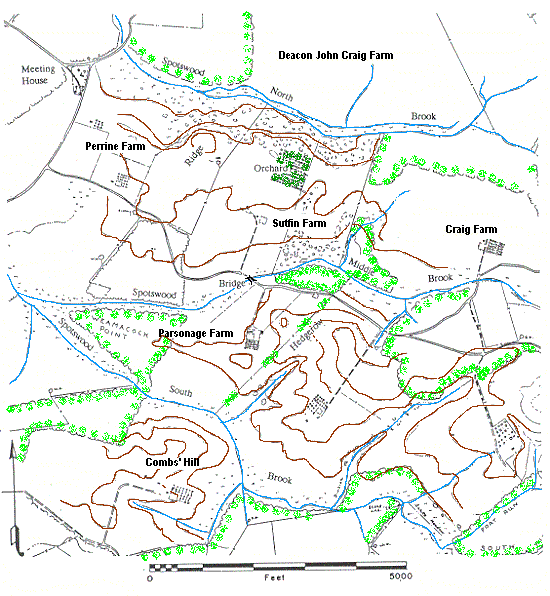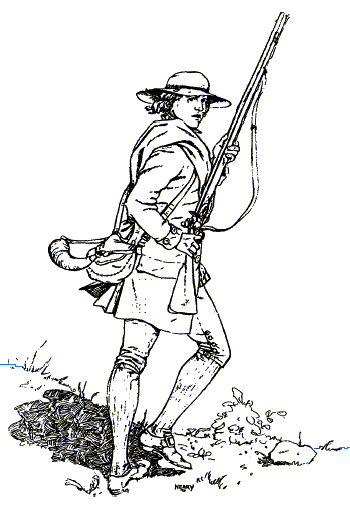APPENDIX
H
“More Glorious to America
than at first Supposed ..."
New Jersey Officers Describe the Battle of
Monmouth
Narrators
Joseph Bloomfield, major 3rd New
Jersey
Jonathan Forman, captain 4th New
Jersey
Israel Shreve, colonel 2nd New Jersey
Sylvanus Seely, colonel Morris County militia

For a copy that opens in a separate window, which you can refer to as you read, click here
All in all, the New Jersey Brigade’s role in the Monmouth battle consisted of marching, countermarching, confusion, and standing or lying in formation during the afternoon cannonade. Major Joseph Bloomfield, 3rd New Jersey Regiment, succinctly wrote of the action in his journal:
(Note: The Bloomfield Diary of the march to Monmouth is in Appendix A - Jump to there).
Sunday. 28. [June] Genl. Lee’s Division the Marquis’s corps & the Jersey Brigade advanced within full view of the Enemy near Monmouth-Court-House but were ordered to retreat, and form, and form & retreat in sight of the British Grenadiers who continued advancing till we fell in with Genl. Washington’s Main-Army, when we were ordered to form the second line whilst the Front line commanded by our illustrious Genl. in person engaged the flower of the British army on the highths near Freehold Court-House … Drove the proud King’s-Guards & haughty British-Grenadiers, & gained Immortal-honor, to the Shame & infamy of Genl. Lee who acted the part of the base [word omitted in manuscript] in not engaging the Enemy when he had received positive orders to attack them … The Front Line of the Army lodged on the Field of battle. The Rear line at EnglishTown.2
Colonel Sylvanus Seely, Monmouth County militia, provided a citizen-soldier’s account:
(Note: The Seely Diary of the march to Monmouth is in Appendix A - Jump to there).
Jun 28th, Recd orders to march down & attack the enemy on their rear to retard their march until the Continental Troop came up - I accordingly came up with their rear guard which consisted of horses. We attacked them and drove them back and they formed in a line across the plain west of the Court House at ½ after eight the enemy retreated and we all retreated into the meeting House and Genl.. Washington came up & formed on the Heights about the meeting house and there came on a pretty severe action in which the enemy Lost Col. Munkton & Col. Carhart & several officers of distinction and left about 200 dead on the ground. Numbers died on both sides with heat; we lay at English Town all night.5
Captain Jonathan Forman’s diary account (4th New Jersey Regiment):
the 28.th Sunday. orderd to March Early in the Morning Under comm.d of Genr.l Lee with Ab.t 5000 troops to Attack the rear of the Enemy Near Monmouth courthouse, which being [done?] by Genr.l Scotts light troops and Genr.l Wayne we retreated to the heights near henry Parres house [Henry Perrine, farmer and tanner, owned the plantation which surrounded the new meeting house] where Genr.l Wasington having posted a large reinforcement the Action was renew.d with a very warm Canonade, and Obliged the Enemy to retreat with the loss of Field Off[ice].rs among which was Colo: Monckton P[?] our loss 4 Field Off.rs [including] lt. Col: Bonner [of] Pa. [Rudolph Bunner, 3rd Pennsylvania Regiment].1

At least ninety of the New Jersey nine-months levies are known to have worn their own clothing and equipment during their term of service in 1778. If civilian coats were accepted for use by the new levies, then at least some of the men from the New Jersey militia serving with Maxwell's Brigade wore clothing similar to that illustrated here. Illustration by Donna Neary, from Marko Zlatich, New England Soldiers of the American Revolution (Santa Barbara, CA, 1993). Reprinted courtesy of Bellerophon Books.
Colonel Israel Shreve, 2nd New Jersey Regiment, wrote his wife Mary the day after the battle from Englishtown,
I have the pleasure to Inform you that yesterday a Battle was fought between His Excellency Gen. Washington and Gen. Clinton with part of their army. the Glory of the Day was Doubtful for five or six hours but at Last turned in the favour of us. the Enemy was Drove off the Ground. after it was over I Vewed the field of Battle where many Brittish Granedier and Light Infantry Lay Weltring in their Gore. among them Col: Monkton Col: Hide and many other Officers and three or four Hundred men, Last night they Retreated off [and] Left behind at monmouth Courthouse ffity wounded among them several officers. we took near one hundred prisoners, our whole Loss is Inconsiderable, Colo: Bonner is kiled with three other field officers, upon the whole it is Glorious for America, men was never more obstinate than the Brittish yesterday, But forsed to Give way to Americans, the Cannonade was heavyer than Ever known on the field in America before, Colo: [Francis] Barber of our Brigade Wounded through his side But I hope not mortal.3
Three days later Colonel Shreve sent a more detailed narrative; Englishtown, 2 July 1778,
We are at this place with our Brigade [and] shall march tomorrow morning Down a Little below monmoth Courthouse, the Enemy are about Embarking between middletown point and the Hook ‑ the battle of monmoth fought Last Sunday between the Army of the United States of America Commanded by his Excy Gen. Washington in person and that of Great Britain, Commanded by his Excy Sir Henry Clinton, proves more Glorious to America than at first Supposed. I here Send you an Exact list of the killed Wounded & missing of our Army, together with that of the Enemys Dead &c, ‑
Battle of monmoth Sunday 28th June 1778
Enemy's Loss Buried the next day 247 allow four times that the number Wounded 988 1235 their Deserted & missing Since they Left philadelphia are at least as many more 1235 Such Reduces their army 2470 & mostly the flowr of their Army --
Our Loss according to a Return made to the adjutant General Killed and Died with heat 69 Wounded 144 Missing 147 340 Our missing will more than one half Come in among the Enemy Loss killed are Colo Monkton Commanding the Second Battallion Granidiers, Colo Hide first Regt Guards with several other officers, Mortally Wounded Colo Abercrombe Commanding the Second Battallion Light Infantry with several other officers, Several Has since Died of their Wounds among Our killed, Colo Bonner, Major Dickinson Mortally wounded Capt Cook of Artillery, Wounded Colo Barber 3rd J[ersey]. R[egiment]. supposed not mortall, upon the Whole this is the Greatest Victory Gained over the British Army since the Commencement of the war, it has timely happened and Done the Greatest Honour to our Great and Brave General Washington who Commanded in person
What pleasant Countenances was to be seen after the Battle was over in our Army, the Stoutest and Bravest of the Brittish Grandiers fell on the Enemys Left, on their Right the Scotch Infantry, in the Center the kings Guards and other Chosen troops, of those men the field was strewed premiscously [sic] now and then a Brave American with them ‑ What was most pleasing they had two Guides Sam Leonard and Thomas Thomson Both lived in this Neighbourhood, and both killed in the first of the Action, Leonard was Laying Down, took with a Cannon Ball in the Left Sholder Come out in his Belly. Our Grand Army marched this morning towards the North River. Our Brigade is to remain in Jersey untill further Orders, Assoon as the Enemy Are Embarked, I shall have the happiness I hope to see you at home after much fateague and Danger Our Brigade was not Immediately Engaged But Drawn up in the Second Line, where Cannon Ball flew plentyfully, my horse Squated, and I Cowardly Do[d]ged, which Saved my head, however amiss of an inch is as Good as a mile, I was after the Battle much fateagued with the heat which made me very unwell But now Am in Good health ...4
Sources
1. Anonymous Revolutionary war diary, Fellows Papers, box 2, Department of Rare Books and Special Collections, Rush Rhees Library, University of Rochester. (Diary transcription by Bob McDonald and John U. Rees). Likely author, Jonathan Forman, captain, 4th NJ Regiment.
2. Mark E. Lender and James Kirby Martin, eds., Citizen Soldier ‑ The Revolutionary War Journal of Joseph Bloomfield (Newark: New Jersey Historical Society, 1982), 136-137.
3. Israel Shreve to Mary Shreve, 29 June 1778, Israel Shreve Papers, Buxton Collection, Louisiana Tech Univ., Ruston, La.
4. Israel Shreve to Mary Shreve, 2 July 1778, Dreer Collection, Historical Society of Pennsylvania, "Soldiers of the Revolution", box IV (series 52:2, vol. IV).
5. Sylvanus Seely Diary (colonel, Morris County militia), original in Morristown National Historic Park Collection, World Wide Web transcription, http://www.popenoe.com/Diary/Seely%20Diary%203.htm